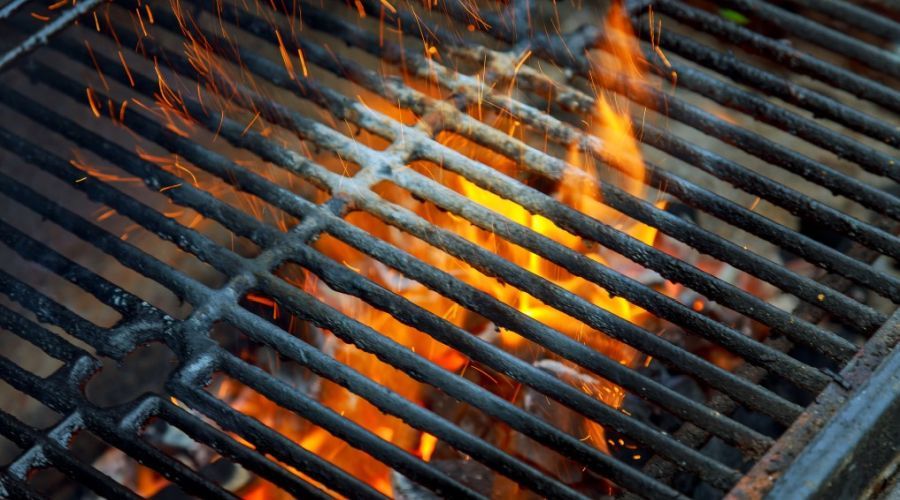Avoiding Flareups on Fatty Meats: Tips for BBQ Lovers
Written By James Morgan
For many barbecue enthusiasts, mastering the art of grilling involves more than just perfecting the marinade or achieving the right sear. A common challenge faced during grilling sessions is avoiding flareups on fatty meats. When fat drips onto hot coals or burners, it leads to sudden bursts of flame, potentially charring your meat and ruining your meal. Understanding why flareups occur and how to prevent them is crucial for a successful barbecue experience.
Flareups are not only an inconvenience but can also be dangerous if not managed properly. The key to a safe and enjoyable grilling experience lies in controlling these flareups and ensuring that your meat is cooked to perfection.

The Science Behind Flareups
Flareups occur when fat from meat drips down onto hot coals or gas burners. This fat ignites, causing a burst of flame that can quickly char the exterior of the meat. While a little charring can add flavor, too much can burn the meat and create an unpleasant taste.
Moreover, different types of meat have varying fat content, which can affect the frequency and intensity of flareups. Understanding the science behind this reaction can help you better manage your grill and achieve that perfect cook every time.
Choosing the Right Meat and Tools
One of the first steps in avoiding flareups on fatty meats is selecting the right cuts of meat. While fatty cuts are often more flavorful, they require careful attention to avoid flareups. Opt for meats with a good balance of fat and lean meat, and always trim excess fat before grilling.
Additionally, investing in the right grilling tools can make a significant difference. Consider using a grill basket or grill mat to catch dripping fat and prevent it from reaching the flame. You can find more tips on selecting the right grilling tools in this guide to multifunctional aprons.
Grill Setup and Temperature Control
Proper grill setup is essential in managing flareups. Ensure that your grill is clean and free from old grease and charred bits, as these can also contribute to flareups. For cleaning tips, visit this guide on cleaning grill grates.
Controlling the temperature is another crucial factor. High temperatures can cause fat to drip rapidly, leading to more frequent flareups. Start by preheating your grill to a moderate temperature and gradually increasing it as needed. This approach allows you to maintain control and prevent unwanted flareups.
Techniques to Reduce Flareups
Several techniques can help in avoiding flareups on fatty meats. One effective method is the two-zone cooking technique. By creating a hot and a cool zone on your grill, you can sear meat over high heat and then move it to the cool zone to finish cooking. This method minimizes the risk of flareups while ensuring evenly cooked meat.
Another technique is to keep a spray bottle of water handy. Lightly misting the grill when flareups occur can help control flames without affecting the grill temperature. However, use this sparingly to avoid steaming your meat.
Maintaining Clean Grill Grates
Clean grill grates are vital in preventing flareups. Residual fat and grease from previous grilling sessions can ignite easily, leading to flareups. Regularly clean your grill grates after each use to reduce this risk. For more detailed cleaning tips, check out this article on avoiding burned food on grill grates.
Additionally, seasoning your grill grates can create a non-stick surface that prevents meat from sticking and tearing, which reduces the amount of fat that falls through. Learn more about seasoning techniques in this comprehensive guide.
Using Marinades and Rubs Wisely
Marinades and rubs enhance the flavor of your meat but can also contribute to flareups if not used correctly. Sugary marinades are particularly prone to burning, so apply them during the last few minutes of cooking to minimize flareups. For dry rubs, ensure they are thoroughly mixed with oil or water to prevent them from falling through the grill grates.
Consider using indirect grilling methods when applying marinades. This approach allows the flavors to infuse into the meat without the risk of flareups. More tips on indirect grilling can be found in our lightweight apron guide.
Wind and Weather Considerations
Weather conditions can significantly affect your grilling experience. Wind can exacerbate flareups by increasing the oxygen flow to the fire, making it essential to position your grill in a sheltered area. Moreover, grilling in cold weather requires more attention to temperature control, as the grill may need more time to reach the desired heat.
For those grilling in diverse weather conditions, investing in weather-appropriate gear is recommended. Learn more about choosing the right gear for your grilling needs in our eco-friendly apron article.

FAQs
What causes flareups on the grill?
Flareups occur when fat drips onto hot coals or burners, igniting a flame. This is common with fatty meats and can be managed by trimming excess fat and controlling the grill temperature.
How can I prevent flareups when grilling fatty meats?
Prevent flareups by using a two-zone cooking technique, maintaining clean grill grates, and controlling the grill temperature. Additionally, consider using a grill mat or basket to catch drippings.
Are flareups dangerous?
While small flareups are generally manageable, large flareups can be dangerous, causing burns or grill damage. It's important to manage flareups effectively to ensure a safe grilling experience.



